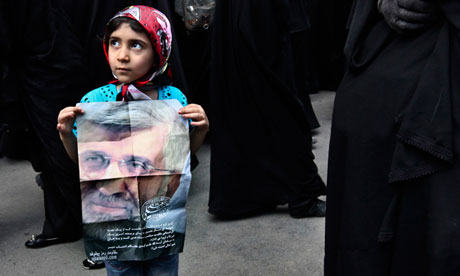
A young girl holds a
photograph of Saeed Jalili, Iran's lead nuclear negotiator and a
candidate in the country's presidential election on 14 June. Photograph:
Vahid Salemi/AP
However far elections in Iran
fail the basic test of being free and fair, they are not, paradoxically
foregone conclusions. Last month, as hundreds registered to stand for
the presidential election, everyone groaned as the two heavyweights who
could have counterbalanced the overarching power of Iran's supreme
leader, former presidents Mohammad Khatami and Akbar Hashemi Rafsanjani,
either refused to run or were disqualified. Countering rumours that he
was too old and thus unfit for the presidency, Rafsanjani revealed this
week that the guardian council had been swayed in its deliberations by a
senior security figure, reinforcing the notion that his exclusion was
politically motivated. So much for the predictable.
But now for the opposite. Saeed Jalili, Iran's chief nuclear negotiator, who many saw as Ayatollah Ali Khamenei's preferred candidate, has performed terribly, particularly on his special subject – the handling of Iran's nuclear negotiations. It has come under fire from all sides – moderates and conservatives alike. Hassan Rouhani, a moderate cleric and former chief nuclear negotiator himself said it is great to have the uranium enrichment centrifuges spinning, providing that Iran keeps its economy spinning too. Ali Akbar Velayati, a conservative who advises Khamenei on foreign policy, also laid into Jalili during a television debate, saying that the art of diplomacy was to preserve Iran's nuclear rights, not to see sanctions increase. Jalili's star is falling, but under this system there are still five of the original eight who made it through the guardian council hurdle whom Ayatollah Khamenei would be comfortable with as president.
But that is not all. Iran's beleaguered reformists have thrown their weight behind Rouhani. To avoid splitting the vote , the other reformist candidate, Mohammad Reza Aref, withdrew on Monday in what appeared to be a coordinated plan. In addition, a consensus is now forming within what remains of the green movement, whose leaders are under house arrest, and among prisoners a no-vote or a spoiled vote is a vote for conservatism. They well remember that in 2005 more people did not vote than voted for the regime candidate Mahmoud Ahmadinejad. The election is not going to be boycotted by the opposition, and this can only be good news.
Elections are run by the ministry of interior, part of the government dominated by the outgoing president. He has become an opponent of those around Ayatollah Khamenei, although he has not attacked the supreme leader himself. All this points to a more freewheeling event on Friday than anyone could have imagined last month. The current conservative favourite is Tehran's mayor, Mohammad Bagher Ghalibaf. A further runoff vote would favour his side, but anything is still possible.
• This article was amended on 13 June 2013. The original misspelled "foregone" as "forgone".
But now for the opposite. Saeed Jalili, Iran's chief nuclear negotiator, who many saw as Ayatollah Ali Khamenei's preferred candidate, has performed terribly, particularly on his special subject – the handling of Iran's nuclear negotiations. It has come under fire from all sides – moderates and conservatives alike. Hassan Rouhani, a moderate cleric and former chief nuclear negotiator himself said it is great to have the uranium enrichment centrifuges spinning, providing that Iran keeps its economy spinning too. Ali Akbar Velayati, a conservative who advises Khamenei on foreign policy, also laid into Jalili during a television debate, saying that the art of diplomacy was to preserve Iran's nuclear rights, not to see sanctions increase. Jalili's star is falling, but under this system there are still five of the original eight who made it through the guardian council hurdle whom Ayatollah Khamenei would be comfortable with as president.
But that is not all. Iran's beleaguered reformists have thrown their weight behind Rouhani. To avoid splitting the vote , the other reformist candidate, Mohammad Reza Aref, withdrew on Monday in what appeared to be a coordinated plan. In addition, a consensus is now forming within what remains of the green movement, whose leaders are under house arrest, and among prisoners a no-vote or a spoiled vote is a vote for conservatism. They well remember that in 2005 more people did not vote than voted for the regime candidate Mahmoud Ahmadinejad. The election is not going to be boycotted by the opposition, and this can only be good news.
Elections are run by the ministry of interior, part of the government dominated by the outgoing president. He has become an opponent of those around Ayatollah Khamenei, although he has not attacked the supreme leader himself. All this points to a more freewheeling event on Friday than anyone could have imagined last month. The current conservative favourite is Tehran's mayor, Mohammad Bagher Ghalibaf. A further runoff vote would favour his side, but anything is still possible.
• This article was amended on 13 June 2013. The original misspelled "foregone" as "forgone".









0 comments:
Post a Comment